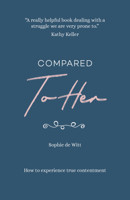
If recent reports into smartphone and social media usage are to be believed, then the answer is probably a yes. And, shockingly, if you’re a female then the link between the amount of time you spend on social media and the likelihood of you experiencing anxiety and depression are even higher.

Reveals the causes and effects of destructive comparisons, and shows how knowing Christ is the key to real contentment.
And, arguably, it’s not too difficult to work out why. Because if you use your smartphone for social media, then the chances are you're keeping half an eye (if not your full and regular attention) on what your peers are doing.... what cars they're driving, what holidays they've been on, and what shape they're in. And the question that always lingers in your mind as you scroll through endlessly filtered photos, exaggerated status updates, and news of events that you’ve not been invited to is, "How am I doing in comparison?"
Some days you might measure up pretty well (and you might even feel a little bit smug), but on other days, when your clothes don’t quite fit as you want them to, or when your bank balance has just taken a battering from another unexpected outgoing, the unfavourable comparison can leave you feeling miserable.
Comparison is not a modern phenomenon. (The phrase, “all comparisons are odious” was recorded as early as the 15th century. And you don’t have to read very far into the Bible to see the destructive outworkings of envy.) But, arguably, this age-old struggle has been intensified in the 21st century by the rise of personal technology and social media.
So, why do we do it? And how do we stop it? Sophie De Witt’s book, Compared to Her brilliantly answers some of these questions in a way that sensitively and practically challenges a struggle that we’re all prone to...
"Pause for a moment before reading on, and just ask yourself: When I compare myself with someone else, why do I do it? What am I hoping to get out of it? Maybe you had one of these answers, or something like it:
I don’t know; I just do it (it’s an unthinking compulsion).
Because I want to know how I’m doing in life. Am I doing as well as I could be, or is there more I need to get or do?
I want to make sure that I’m “normal”.
I need to make sure that I’m not missing out on something that others are enjoying.
It makes me feel better when I realise I’m doing something better than someone else.
Because my parents told me throughout my childhood to be a little bit more like my sister/other people’s children.
Underneath each of those answers to the question “Why compare?” is one of three motivations:
I want to know I’m worthwhile (I want to know I’m significant).
I want to know that my life is as good as it could be (I want to be satisfied).
I want to know that I’ve got what I need in life (I want to feel secure).
Of course, sometimes it’s a mixture of all three. Essentially, what I’m after is to make sure I’ve got as much, or more, of something than others, so that I can feel significant about who I am, satisfied about what I’m doing and secure about where I’m heading. This behaviour, or Compulsive Comparison Syndrome (CCS) as I like to call it, is a compulsive measuring of myself against the standards of others, desiring a higher position.
Who was the last person you looked at and thought: “I wish I had her…”? How about: “I’m so glad I’m not like her when it comes to…”?
I’ll compare myself with anyone. Strangers in a shopping centre, airbrushed models in a magazine. The owners of the houses on home improvement shows.
But most often, since they’re most similar to me and I see their lives in detail most often, it’s my friends, my family, the people I see most days. After all, when I compare my face to Angelina Jolie’s, I’ve got several ready-made excuses: her skincare budget is probably more than our annual income; and, of course, she’s probably been airbrushed. In my mind, she’s in a different world to me. When I compare my children’s behaviour to the kids of my friend who lives down the street, however, I don’t have the same excuses. She’s part of my world, and so that comparison has more of an effect on me.
But we can also compare ourselves with people who don’t exist. Ever caught yourself comparing who you are now with who you were twenty years ago, or comparing yourself with who you dreamed you’d become, or with other people’s expectations of you?
It seems to me that most of us are comparing ourselves with others all the time, in all kinds of ways. That’s the problem with a compulsion; it happens unconsciously, without us even really noticing it’s happening.
CCS is not easy to be rid of. But it is wonderful to live without. This side of death, we’ll all be recovering sufferers. But as we live the gospel, letting God be God, treating Jesus as our Creator and Saviour, we can know real blessing. We can experience the significance of being made and loved by Him; and the satisfaction of living for Him; the the security of knowing He will give us fullness of life without end. What a wonderful life He has given us! How can you and I not say…
“Praise be to the Father and God of our Lord Jesus Christ, who has blessed us in the heavenly realms with every spiritual blessing in Christ.” (Ephesians 1 v 3)
That’s really the sign of a woman who enjoys a heart which has replaced CCS with contentment: she praises her God, and is looking forward to doing so for ever."
Read more about how to find lasting contentment, and freedom from comparison, in Compared to Her by Sophie De Witt which is available to buy here.